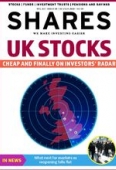Archived article
Please note that tax, investment, pension and ISA rules can change and the information and any views contained in this article may now be inaccurate.
International Biotech looks for M&A booster shot

When Kate Bingham, managing partner of SV Health Managers LLP was appointed chair of the UK Vaccine Task Force by the Government, it made life awkward for the team managing the International Biotechnology Trust (IBT).

That’s because Bingham oversees the unquoted part of the portfolio, representing around 11.2% of the trust’s assets and to ensure there were no conflicts of interest, the managers precluded themselves from investing in companies developing promising vaccines, with this restriction set to stay in place until the end of December 2021.
The stocks it was prevented from buying included one of the big winners, US biotech firm Moderna, whose shares are up over 10-fold since the start of the pandemic.
Co-manager Ailsa Craig estimates that the value of the companies that were effectively ‘off-limits’ make up around 10% of the trust’s benchmark, the Nasdaq Biotechnology index.
This accounts for some of the trust’s underperformance over the last year with the net asset value flat compared with the benchmark return of 6.9%.
Meanwhile the shares have fallen 3.2% resulting in the small premium to net asset value virttually disappearing.
It is worth noting that the trust actively manages the discount/premium by buying shares when a discount emerges and issuing shares when the shares trade at a premium.
Over the last five years the trust has delivered a return in net asset value of 61.9% compared with 71.2% for the benchmark, while the shares are up 92%.

CHANGE IN PERSONNEL, NO CHANGE TO STRATEGY
Lead manager Carl Harald Janson who has led the team since joining SV Health in 2013 stepped down in March but his services will be retained as a senior advisor.
The co-lead managers of the trust are now Ailsa Craig who has been with SV Health for 15 years and Marek Poszepczynski, who was recruited by Janson and has worked closely with Craig for several years.
Research house Kepler said the change represented an evolution rather than a step change in management.
Their expertise comes at a price with an annual charge excluding performance fees of 1.29%. This is towards the higher end of the biotech and healthcare trust space and higher than the 1.16% average for the sector according to data from investment trust industry body the Association of Investment Companies.

STRONG DIFFERENTIATORS
The biotechnology sector can be volatile due to the early stage nature of the companies in the index and the nature of scientific discovery, which can bring about abrupt changes in fortune.
An impressive and attractive feature of the trust’s long-term outperformance has been the low volatility of its returns.
This is due to the manager’s risk mitigation policy and the wide diversification achieved across different therapeutic areas and stages of drug development.
The managers reduce risk by trading around binary events such as the results of clinical trials, reducing weightings ahead of an event and topping up once the results are known, if appropriate.
The trust focuses on therapeutic areas which have strong pricing power such as cancer and orphan drugs.
Orphan drugs are intended to treat rare diseases. This niche area conveys certain financial advantages such as several years of exclusivity, drugs being readily reimbursed by insurers, and regular exemption from price controls.
The team looks for companies addressing unmet medical needs and which have a single or wholly owned asset or own a monopoly position in a market.
Around 75% of the portfolio is invested in companies that either have revenue which is growing fast or are more stable and profitable, with the remainder invested in development stage firms.
Another differentiating feature of the trust is its commitment to pay a dividend equal to 4% of its assets, which is paid out of capital.
Finally, the trust provides investors access to innovative, early-stage biotech companies via a holding in SV Health’s unquoted portfolio, SV Fund VI, utilising its venture capital skills.
CURRENT POSITIONING
While the small cap names in the Nasdaq Biotechnology index have performed very well, larger names which the trust has exposure to have not participated in the market advance and the managers believe these ‘out of favour’ names are ripe to play catch-up, trading on cheap valuations.
In addition, the trust has built-up exposure to smaller companies in the $5 billion-to-$20 billion market cap range, which the managers believe could be attractive merger and acquisition targets for big pharma and biotech.
These companies are those which have passed the usual hurdles of proving a drug is both safe and effective, significantly de-risking the business.
However, they lack the marketing muscle and distribution capacity of the bigger firms, which provides an opportunity to add near-term contribution to the revenues and profits for the acquirer.
Good examples highlighted by Craig include Biohaven which has a new migraine drug recently launched and Horizon Therapeutics, a rare disease company recently launched a drug for Thyroid Eye Disease during the pandemic which has been incredibly successful.
Important information:
These articles are provided by Shares magazine which is published by AJ Bell Media, a part of AJ Bell. Shares is not written by AJ Bell.
Shares is provided for your general information and use and is not a personal recommendation to invest. It is not intended to be relied upon by you in making or not making any investment decisions. The investments referred to in these articles will not be suitable for all investors. If in doubt please seek appropriate independent financial advice.
Investors acting on the information in these articles do so at their own risk and AJ Bell Media and its staff do not accept liability for losses suffered by investors as a result of their investment decisions.

 magazine
magazine








